@MerlinofCanada:
People in BC and Alberta have no idea how much fresh water is destroyed in fracking
B.C. oil and gas producers warned of potential water shortages in drought-stricken areas
Fiona Kenny@fionakennyantiq:
Amazed grain and canola producers and cattle farmers aren’t protesting more. It’s a dangerous abuse of an essential resource.![]() Ignorance is bliss.
Ignorance is bliss.![]()
@MerlinofCanada:
In Alberta those same farmers and cattlemen voted for a government that will sacrifice everyone ![]() and everything, including dams and water
and everything, including dams and water![]() to keep oil and gas happy
to keep oil and gas happy
R Heyman@russ2dfx:
I have been angry about this for a while now. It’s pathetic that we use such an important resource this way.
Marcella@grg_mc:
Not to mention the earthquakes that sets off.
LS@Lasirois77:
They are trying to frack next to the Brazeau dam right now. It will be a catastrophe
@IamaCassandra:
Not only earthquake risks, there’s the question of where do these massive volumes of water come from? Oh well, the Brazeau Dam is very convenient … to be remembered is that the water is pumped kms into the ground…never to return to the water/rain cycle. Stolen H2O = DROUGHT!
LeeAnnFoster@funkiefoodie:
it’s obscene the amounts! Also water is finite. The ultimate crime against nature!
@GrumpyNubbs:
How will they make Beer? That might get their attention!
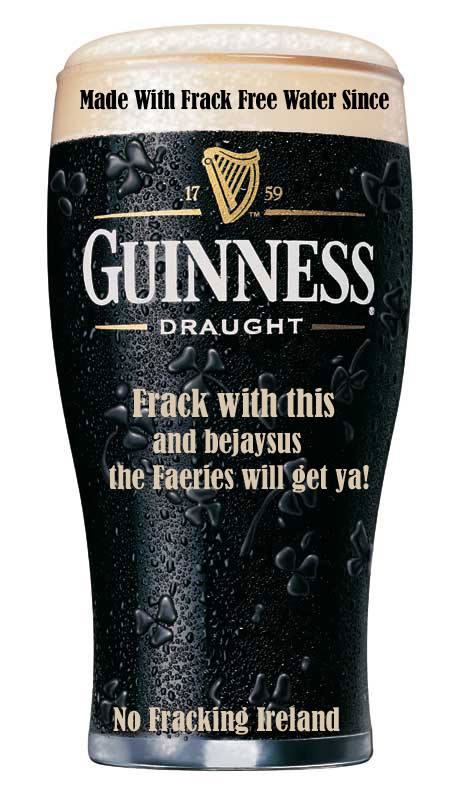
Guinness draught, Made with frack free water since 1759. Frack with this and bejaysus the Faeries will get ya! No Fracking Ireland
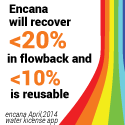
B.C. oil and gas producers warned of potential water shortages in drought-stricken areas, Extreme drought continues in northeast B.C., where much of province’s natural gas production is concentrated by Karin Larsen, CBC News, Feb 04, 2024
The agency overseeing oil and gas producers in British Columbia is warning of potential water shortages in 2024.
The B.C. Energy Regulator (BCER), formerly the B.C. Oil and Gas Commission, says persistent drought last summer and fall in the northern part of the province continue to negatively affect streamflows and groundwater, with snowpack levels at last reading only 72 per cent of the historical average.
“The combined impact of these events has created an increased potential for drought conditions in 2024 and another summer of possibly limited water supply in the north,” reads the notice posted Jan 26.
The northeast of the province, where much of B.C.’s oil and gas production is concentrated, has been hit hardest by the drought.
The four water basins in the region — Fort Nelson, East Peace, North Peace and South Peace — remain at drought level 5, the most severe classification on the provincial scale. Level 5 is declared when “adverse impacts to socio-economic or ecosystem values are almost certain.”
- Alberta to launch ‘unprecedented’ water-sharing negotiations Thursday amid drought fears
 Ya, right, “sharing.” TBA/UCP evangelical thugs will make sure oil, gas, coal, bitumen and frac get it all the water (Rob Renner, past environment minister already promised frac’ers they could have it all, when companies complained there isn’t enough water in Alberta for companies to frac all they want to frac). The rest of us can live stinky, thirsty or die from lack of water, TBA/UCP give no shits about anyone but themselves and industry and are too arrogant and stupid to realize companies will take their water too.
Ya, right, “sharing.” TBA/UCP evangelical thugs will make sure oil, gas, coal, bitumen and frac get it all the water (Rob Renner, past environment minister already promised frac’ers they could have it all, when companies complained there isn’t enough water in Alberta for companies to frac all they want to frac). The rest of us can live stinky, thirsty or die from lack of water, TBA/UCP give no shits about anyone but themselves and industry and are too arrogant and stupid to realize companies will take their water too.
A significant portion of gas extraction in the region involves water-intensive hydraulic fracturing, or fracking.
… BCER hydrologist Ryan Rolick said the warning about potential water shortages was issued out of an abundance of caution, recognizing that snowpacks might still improve, and that spring and summer could still deliver the precipitation desperately needed.![]() A true abundance of caution would have frac’ing criminalized, globally, not just in severe drought afflicted oil and gas jurisdictions like BC, SK and Alberta
A true abundance of caution would have frac’ing criminalized, globally, not just in severe drought afflicted oil and gas jurisdictions like BC, SK and Alberta ![]()
But the opposite is also possible, he said.
“If snowpacks do not improve, or if we have a similar spring and summer to 2023, it could mean another season of potentially critical water shortages, primarily in the northeast,”![]() Coincidence? That’s where frac’ers are intentionally permanently removing masses of water from the hydrogeological cycle, year in, year out, drought or not
Coincidence? That’s where frac’ers are intentionally permanently removing masses of water from the hydrogeological cycle, year in, year out, drought or not![]() said Rolick.
said Rolick.
In a statement, the Canadian Association of Petroleum Producers (CAPP) said its members in B.C. are monitoring the drought situation.
“In northeastern B.C., operators rely on recycling water from their own operations to maintain activities and minimize the use of freshwater resources,” said CAPP vice-president Richard Wong.
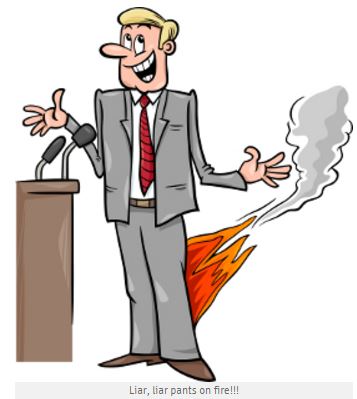
![]() Reality Check:
Reality Check:
2009: National Energy Board (now Canadian Energy Regulator) A Primer for Understanding Canadian Shale Gas – Energy Briefing Note
… Frac water often contains chemical additives to help carry the proppant and may become enriched in salts after being injected into shale formations. Therefore, frac water that is recovered during natural gas production must be either treated or disposed of in a safe manner. … Flow-back water is infrequently reused in other fracs because of the potential for corrosion or scaling, where the dissolved salts may precipitate out of the water and clog parts of the well or the formation.
End Reality Check.![]()
“According to the energy regulator, each year the amount of water withdrawn by industry averages 0.004 per cent of the total volume of annual runoff in northeast B.C.”

![]() CAPP and BCER (and AER) are notorious liars. CAPP members rape and abuse water; BCER is their rape enabler, just like AER is in Alberta.
CAPP and BCER (and AER) are notorious liars. CAPP members rape and abuse water; BCER is their rape enabler, just like AER is in Alberta.![]()
- Snowpack levels across B.C. averaging 56 per cent of normal this January: province
- B.C. ski resorts face low snow levels as climate change exacerbates typical weather cycles
CBC science specialist Darius Mahdavi says the drought in the northeast has been at or near Level 5 since the fall of 2022.
“The only exception was a couple weeks at the beginning of the 2023 drought season, when snowpack and cool temperatures helped briefly, but there was an incredibly fast return to extreme drought,” he said.
“In the last couple years, B.C. has seen a lot of weather that’s been described as ‘unprecedented’, ‘record-breaking’ and ‘historic.’ The drought in the northeast is all three, yet it’s been largely overlooked.”
Water permits remain indefinitely suspended on 10 rivers located in the Peace, Liard and Fraser River watersheds, according to the BCER.![]() Frac’ers don’t fret about such things as permits. They build illegal water hoarding dams and take from and transfer water to wherever they please with miles of hoses and armies of trucks, sans permit.
Frac’ers don’t fret about such things as permits. They build illegal water hoarding dams and take from and transfer water to wherever they please with miles of hoses and armies of trucks, sans permit.![]()
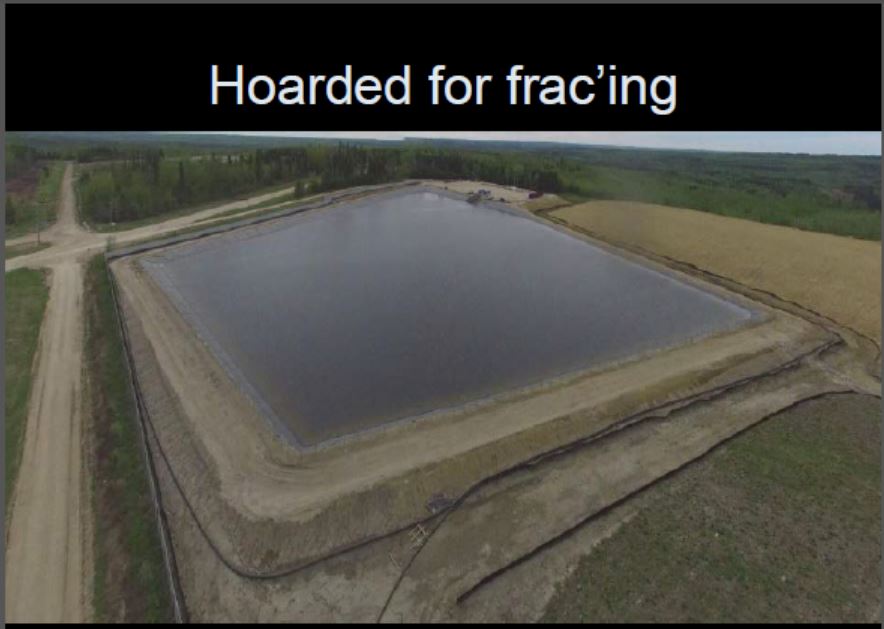
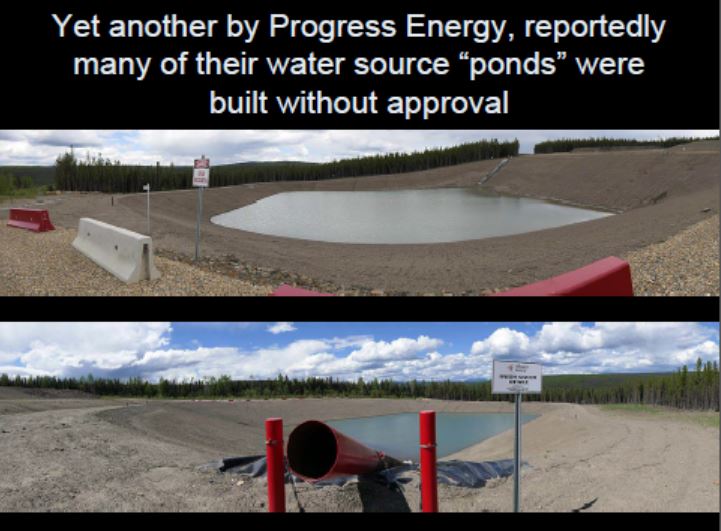
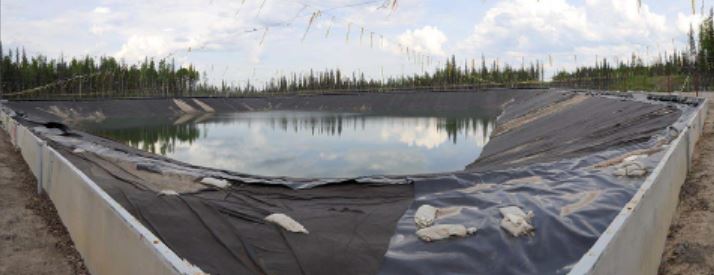
Rolick said the message to the oil and gas sector is to be prepared for further![]() ???
???![]() water-use restrictions or suspensions.
water-use restrictions or suspensions.
“[Industry] should make sure they’re updating their water management plans and that they’re looking at having appropriate storage solutions so that they can withdraw when it is available and store it for use in the dry season,” he said.![]() Regulator-assisted hoarding and raping of water by frac’ers during severe drought.
Regulator-assisted hoarding and raping of water by frac’ers during severe drought.![]()
![]()
Refer also to:
A proportion (25% to 100%) of the water used in hydraulic fracturing is not recovered, and consequently this water is lost permanently to re-use, which differs from some other water uses in which water can be recovered and processed for re-use.
2009: National Energy Board (now Canadian Energy Regulator) A Primer for Understanding Canadian Shale Gas – Energy Briefing Note
… Drilling and hydraulically fracturing wells can be water-intensive procedures; however, there is very limited Canadian experience from which to estimate potential environmental impacts. …
Frac water often contains chemical additives to help carry the proppant and may become enriched in salts after being injected into shale formations. Therefore, frac water that is recovered during natural gas production must be either treated or disposed of in a safe manner. … Flow-back water is infrequently reused in other fracs because of the potential for corrosion or scaling, where the dissolved salts may precipitate out of the water and clog parts of the well or the formation.
… Finally, there are some environmental concerns with development of shale gas in Canada. Little is known about what the ultimate impact on freshwater resources will be.
